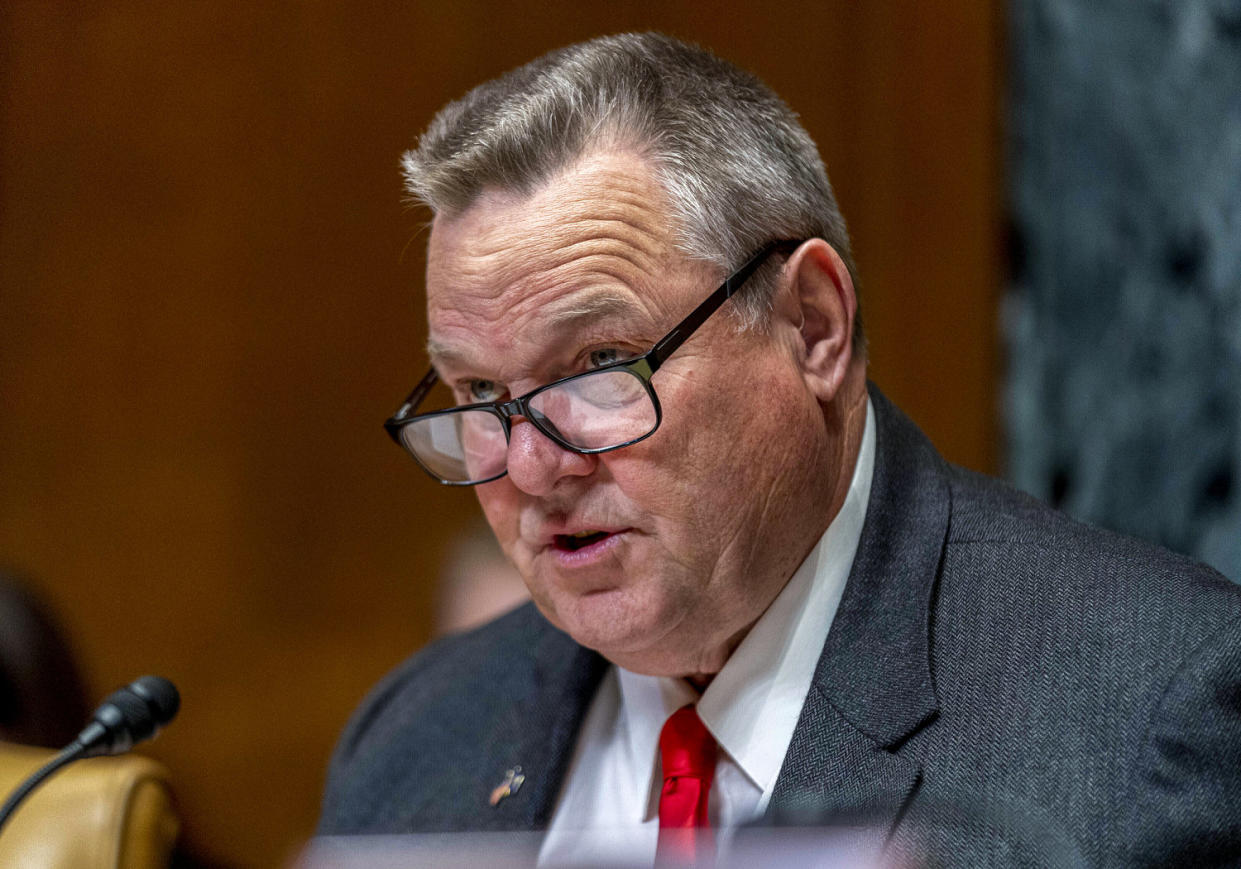Tim Sheehy may turn the Senate red. But is he really a successful businessman?

On Friday, Donald Trump is scheduled to headline a rally in Bozeman, Montana, for Tim Sheehy, a former Navy SEAL who’s running for Senate there as a Republican. Aiming to unseat three-term Democratic incumbent Jon Tester, Sheehy is founder of Montana-based Bridger Aerospace, an aerial firefighting company. A win by Sheehy, a decorated combat veteran, could flip the Senate red.
Sheehy, 38, promises “to fight for every hardworking Montanan and their family” and points to his job creation and entrepreneurial skills as among his qualifications for the Senate. Recent events at his company tell a more nuanced story and raise questions about the firm’s viability, its executive pay and its efforts to obtain government contracts.
Bridger, founded in 2014 and based at the Bozeman Yellowstone International Airport, operates specially equipped planes that scoop up water and drop it on fires. Bridger has 15 aircraft, employs 148 people and its units have fire-suppression and transportation contracts with the Interior Department and the U.S. Forest Service, a part of the Agriculture Department, documents show.
On July 1, Sheehy resigned as chief executive of Bridger to focus on his Senate campaign; the company is seeking a replacement.
“Tim is proud of the successful company he created, the jobs he created, and he is proud to be an active firefighting pilot protecting our communities and our public lands,” Katie Martin, Sheehy’s press secretary, said in a statement. She declined to make Sheehy available for an interview.

For a contest far from Wall Street, Sheehy’s campaign has attracted the attention of some of finance’s biggest names, including Ken Griffin, the billionaire founder of Citadel LLC, the hedge fund and trading powerhouse. Last fall, Griffin donated $5 million to a Super PAC called “More Jobs, Less Government” that has spent almost $11 million this year, or 96% of its receipts, supporting Sheehy, Federal Election Commission records show. They also show that Stephen Schwarzman, the billionaire co-founder of The Blackstone Group, a New York City-based private-equity giant that invested in Bridger, has given $5 million to the “More Jobs” Super PAC over the past year.
“Tim Sheehy cares deeply about America and has an extraordinary record of achievement as a decorated Navy Seal, rancher, and proven business leader,” Griffin said in a statement provided by a spokesperson.
In mid-June, an editorial in The Wall Street Journal echoed Griffin’s view, branding Sheehy’s company Bridger a success.
Bridger’s filings with the federal government, however, undercut that acclaim. A few weeks before the glowing editorial, a May securities filing by the company noted “substantial doubt” about Bridger’s ability to continue operating as a “going concern” over the next year. More bad news came July 1 when Bridger warned that investors could not rely on its 2023 financial statement because it had materially miscalculated an earnings per share measure and would need to restate its results. Bridger also recently warned in regulatory filings that it was not in compliance with financial performance measures it promised to buyers of $160 million in industrial development bonds that it sold in 2022. One such measure: how much money the company is generating to service its debt. If the situation continues, the company said in the filing, it could result in a default on the bonds.
Marc Cohodes, a veteran money manager and Montana resident known among market participants for making bets against companies he believes to be overvalued, questioned Bridger’s prospects. A resident of Gallatin County, where Bridger is headquartered, Cohodes says he’s opining because Sheehy’s claims of business feats don’t add up.
“Bridger Aerospace has been a success for insiders and the Park Avenue billionaires at Blackstone,” said Cohodes, who added that he has no stake in the firm’s stock. “Meanwhile, the company’s shareholders and bondholders are holding the bag. How does that help hardworking Montanans and their families?”
An employee mistake
In seeking to win government contracts, one Bridger unit Sheehy headed after receiving an investment from Blackstone certified itself as a socially and economically disadvantaged company, according to federal documents filed with the Small Business Administration.
A Bridger spokeswoman said in a statement that the certification of the Bridger unit as a socially and economically disadvantaged company was an employee mistake that went undiscovered for four years. She said the firm did not secure any government contracts under that certification and declined to provide details about why it took the firm so long to identify the error.

Meanwhile, Blackstone has cashed out most of its investment in Sheehy’s business.
Asked about Bridger’s finances, the company spokeswoman said the firm is “working to make sure it meets its obligations under the loan agreement,” She also said Bridger is fundamentally strong, has generated year-over-year revenue growth for each of the last five years and expects 2024 to be a record year. The recent restatement does not affect Bridger’s fundamental financial strength, she added.
Last April, ahead of Bridger’s potential default warning, Sheehy and his brother Matthew Sheehy, a Bridger director, gave back company stock awards that had been valued at $30 million when they were received as part of its 2023 public offering. Bridger’s spokeswoman said the Sheehys “approached the company independently and volunteered to return this equity compensation so it could be awarded to current and future employees to incentivize them to continue focusing on long-term shareholder value.”
By the time the men returned the stock awards, the awards were worth roughly $15 million because Bridger’s shares had declined, regulatory filings show.
‘Friends’ at Blackstone
Tim Sheehy began building Bridger a decade ago and found raising money to be an “awful and soul-crushing” experience, he wrote in his memoir “Mudslingers: A True Story of Aerial Firefighting,” published in December. Riding to his rescue in 2018, Sheehy reported, was none other than Schwarzman, Blackstone’s multibillionaire and a major Trump supporter.
Bridger was struggling to find its footing and needed money to buy planes, Sheehy wrote in his book, when Blackstone agreed to make a $150 million investment in the company. According to a 2022 regulatory filing, Bridger took delivery of its first “Super Scooper” plane in 2020.
The bond with Blackstone was lasting, Sheehy. The “crack team” at Blackstone “are partners and friends we still have to this today [sic].”

In early June, Schwarzman contributed $4.6 million to the “More Jobs, Less Government” Super PAC that is throwing big support behind Sheehy, FEC documents show. Schwarzman’s contribution made up 34% of the PAC’s total receipts for the first six months of the year. Schwarzman also contributed $400,000 to the PAC last fall.
Of the PAC’s $11.4 million in disbursements for the first six months of 2024, it has spent $10.9 million, or 96% of the total, supporting Sheehy’s campaign. The PAC spent $5.3 million for Sheehy and $5.7 million against his opponent, Tester, records show.
Blackstone employees have also contributed $28,519 to Sheehy’s campaign, according to Open Secrets. Those contributions make Blackstone-affiliated donors Sheehy’s seventh-largest contributor group.
A Blackstone spokesman said the company does not have a PAC and its employees donate to candidates on both sides of the aisle. So far this year, Open Secrets shows, Blackstone has contributed $3.2 million to congressional candidates, with 57% going to Republicans. Individuals affiliated with Blackstone have given Tester $66,000 this year and are his eighth-largest donor group.
While Blackstone employees support Sheehy’s campaign, the firm itself is in the process of exiting its profitable stake in Bridger. It cashed in much of its holding in 2022 after Bridger sold the $160 million of industrial development revenue bonds through Gallatin County, the bond offering shows.
The offering statement said that proceeds of the bond issue were earmarked for new planes and financing hangars at the Bozeman airport, but added that funds would also be used to pay back previous investors. In the end, $134 million of the $160 million raised from investors in the Bridger bonds went to repay Blackstone, which had financed Bridger’s earlier activities. Less than $20 million in fresh capital from the bond offering went to Bridger for new infrastructure, the offering statement said. The bond proceeds helped Blackstone recoup twice its investment in Bridger, a calculation Blackstone did not dispute.

Bridger’s spokeswoman said the 2022 debt deal enabled Bridger to “improve its operations.”
In 2027, Bridger must redeem the bonds, which were purchased by mutual funds and other institutional investors. Bridger pays 11.5% interest to bondholders, a debt load that has helped push the company’s interest expense in the most recent quarter to $5.9 million, higher than the company’s revenues of $5.5 million in the period, its financial statements show.
Other Bridger investors haven’t been as fortunate as Blackstone in their investments in the company. Bridger’s stock trades around $3.15, down 54% over the past 12 months; the S&P 500 is up 18% during that period. In a July 31 filing, Bridger said Blackstone would be selling its remaining stake in the company’s stock — 9.6 million shares “from time to time” in the coming months. Such pending sales can weigh on a company’s stock.
‘Socially Disadvantaged’
In addition to founding Bridger, Sheehy owns an array of companies, his federal financial disclosure report shows, including Little Belt Cattle Company LLC, a ranching operation, as well as stakes in public company stocks and private-equity partnerships.
Although Bridger generated $119 million in net losses in 2022 and 2023, company insiders, starting with Sheehy, have been paid well. In 2022, Sheehy’s cash and stock compensation neared $5 million, and last year, he received $2.5 million, Bridger’s proxy says. Matthew Sheehy received $1.8 million in cash and stock compensation in 2022 and 2023, the document shows. He is chief executive of Tallgrass Energy, an energy infrastructure services provider owned by the Blackstone Group.
“The board of directors issued stock-based pay to Tim Sheehy and Matthew Sheehy to align their compensation with Bridger’s business objectives and the creation of shareholder value,” the Bridger spokeswoman said. The grants were reviewed by third-party consultants and approved by shareholders when the company went public, she added.
Bridger’s business is “highly dependent on the needs of government agencies to surveil and suppress fires,” it says. Federal records show Bridger Aerospace received contracts worth $16.1 million in 2023 and 2024 from the Interior Department and the Forest Service.
Other Bridger units have separate contracts with the federal government. One is Bridger Air Tanker LLC, which has received contracts worth $118 million from the Forest Service and Interior Department since 2020, documents show. Bridger Air Tanker had itself as a “Small Disadvantaged Business,” its contracts show, and a spokesperson for the SBA confirmed it. It is no longer self-certified as a disadvantaged business.
To qualify for the small disadvantaged business program, a firm must be 51% owned by one or more socially and economically disadvantaged people. The code defines a socially disadvantaged person as someone who has been “subjected to racial or ethnic prejudice or cultural bias within American society because of their identities as members of groups and without regard to their individual qualities. The social disadvantage must stem from circumstances beyond their control.”
Companies that qualify as small disadvantaged businesses can receive preferential treatment on government contracts, according to the Federal Code, with the government awarding 10% of federal contract dollars, or roughly $50 billion a year, to them. The code also says that government agencies can limit awards to competition only among small disadvantaged businesses.
As Bridger Air Tanker did, a company can self-certify to participate in the small disadvantaged business program “if it believes in good faith that it is owned and controlled by one or more socially and economically disadvantaged individuals,” the Federal Code says.
The Bridger spokeswoman said an employee mistakenly certified the company as a small disadvantaged business in 2018. The employee left the following year and the error was not discovered until 2022, the spokeswoman said. No contracts were awarded based on the status, she added.
The SBA inspector general has identified self-certification for these programs as an area of upcoming focus because of risks of financial fraud, said Farrah Saint-Surin, a spokeswoman. “This is something that we are definitely going to look at,” Saint-Surin told NBC News, speaking generally about the program.
In recent years, government contracts were also awarded to Mountain Air LLC, an aerial firefighting company co-owned by Sheehy and his brother Matthew. Between 2017 and 2023, Mountain Air received contracts worth $21.3 million for fire suppression services, aerial mapping and transportation from both the Interior Department and the Forest Service. Mountain Air was self-certified as a service-disabled veteran owned business, the SBA said, before 2022. Sheehy’s decorations include a Purple Heart.
Every year, federal agencies award contract dollars to veteran-owned businesses — at least 5% of all federal contract dollars are designated to businesses owned by service disabled veterans, according to the SBA. Service-disabled veteran-owned small businesses can compete for federal sole-source contracts, which do not go through typical competitive bidding.
Under government rules, companies receiving contracts as veteran-owned businesses must be majority owned — at least 51% — by veterans. A regulatory filing by Bridger in October 2023 and signed by Sheehy stated that he owned just under that — 50% — of Mountain Air, with his brother owning the rest. There is no record of Matthew Sheehy serving in the U.S. military, according to representatives for all branches of the armed services.
Martin, Sheehy’s campaign spokeswoman, said Sheehy had owned 51% of Mountain Air prior to 2022 and provided a 2019 partnership document showing this. She did not provide partnership documents for subsequent years. She said that the ownership of Mountain Air “moved closer to 50%/50% up until the time it was combined with Bridger” in November 2022.

In any case, Mountain Air received the contracts as a self-certified small business, Martin said, not as a service-disabled veteran-owned business. The SBA spokesperson said Mountain Air is no longer self-certified as a service-disabled veteran-owned business.
A spokeswoman for Matthew Sheehy and Tallgrass Energy did not return multiple emails seeking comment.
‘Identifying new investments’
Now that Blackstone has secured its gains in Bridger, the private-equity firm is moving on from the company. Shortly after Bridger’s May disclosure that it was out of compliance on commitments to bondholders, Todd Hirsch, one of Sheehy’s “crack team” at Blackstone, resigned from the Bridger board. At the same time, Blackstone gave up its right to name two directors to Bridger’s board going forward.
Private-equity firms typically hold multiple board seats at the companies they finance — and hang onto them until they have fully exited — to maintain a close watch over their operations, said Thomas A. Waldman, a lawyer specializing in the industry at Stradling Yocca Carlson & Rauth in Los Angeles. Blackstone’s move to give up its board seats while it still held a stake in Bridger “isn’t something I’ve seen,” he said.
A Blackstone spokesman said in early July the move was in keeping with its decision to wind down its small remaining stake in Bridger and it gives the firm “greater flexibility to transact in the stock of the company and allow(s) our executives additional time to focus on identifying new investments.” Sure enough, on July 31, Bridger announced that Blackstone and other shareholders were selling out.
